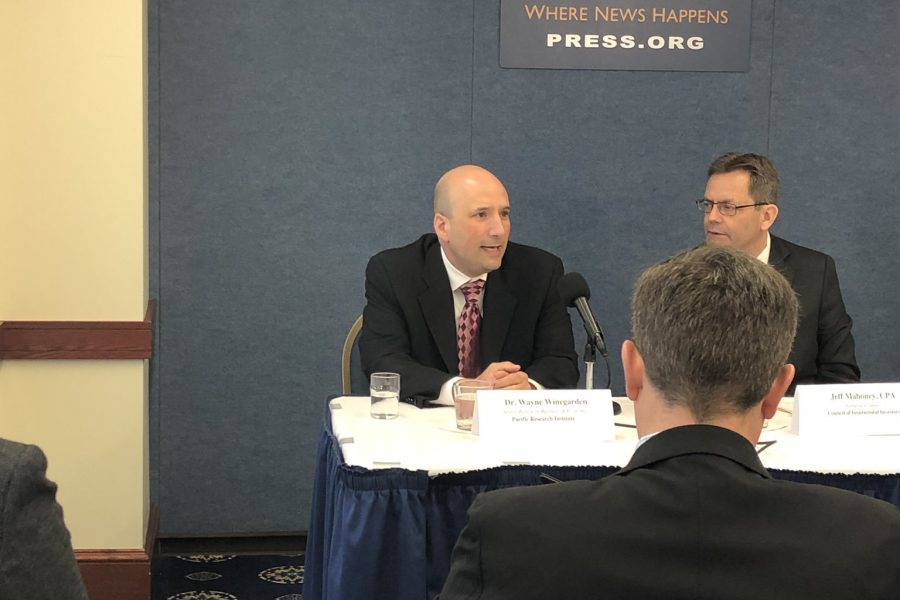Medical Expert from Canada Explains Why Elderly Will Suffer Most Under ‘Medicare for All
By Randy DeSoto
Sally Pipes — CEO of the Pacific Research Institute, who immigrated to the U.S. from Canada — warned Americans that seniors will be among those most negatively impacted through denied health care if Sen. Bernie Sanders-style “Medicare for All” is adopted.
Pipes explained on Fox News’ “Life, Liberty and Levin” on Sunday that the single-payer system Sanders is proposing would mean private health care insurance would be banned, and the government take over and decide what care is provided based on what is “medically necessary for the population.”
Medicare, Medicaid and other government programs would be rolled up into a new government health care system, like that found in Canada or the United Kingdom.
“When people think something is free, they are going to demand a lot more of it,” Pipes said. So, the government will have wait lists and ration care, and “it is the elderly that will be most harmed by rationed care.”
In Canada, according to the medical care expert, the average wait time from a primary care referral to see a specialist is approximately 20 weeks, five months.
To get an MRI, Canadians must wait on average 11 weeks — nearly 3 months.
According to a Fraser Institute study, the longest waits are between a general practitioner referral and orthopedic surgery, which is 39 weeks.
Hadley Heath Manning — policy director with the Independent Women’s Forum — noted that wait time, just over nine months, is the length of a pregnancy. “Imagine being in pain that long, waiting for surgery. And that’s just the average. Some patients wait years,” she told The Western Journal.
Dr. Brian Day, the president of Cambie Surgery Centre in Vancouver, which is Canada’s largest private hospital, affirmed years-long wait times are a reality.
“This is a country in which dogs can get a hip replacement in under a week and in which humans can wait two to three years,” he told The New York Times in 2006.
Day has been engaged in a decade-long legal battle with the province of British Columbia over the government prohibiting residents from accessing medically necessary treatment at his clinic, CTV News reported.
The subject of wait times hits close to home to Pipes, whose mother died of colon cancer in 2005, while a patient in the Canadian health care system.
After going to her doctor and expressing her concern that she might have colon cancer, she was told Pipes recalled, “As a senior, we have too many younger people on the waiting list to get colonoscopies — people are waiting eight months to a year.”
“So she didn’t get her colonoscopy. Six months later she was hemorrhaging, went to the hospital in an ambulance,” Pipes said. “Two days in the emergency room, two days in a transit lounge waiting to get a bed in a ward. She finally got her colonoscopy, but she passed away two weeks later from metastasized colon cancer. This is rationing of care and you reduce costs by denying care to people. It’s very, very sad.”
“Life Liberty and Levin” host Mark Levin responded, “We have the government making decisions about life and death. Not individual human beings making decisions about their own lives.”
Pipes said that Americans need only look to the Veterans Affairs medical system — which is notorious for long wait times — if they want to see a microcosm of what a single-payer system would be like in the U.S.
She noted the federal government would have to hire millions of people to administer the program to replace those currently employed in the private health insurance industry.
Pipes predicted that, without competition, it would likely function in the same bureaucratic fashion as a typical state’s department of motor vehicles.
The Congressional Budget Office released a study last week finding if “Medicare for All” were adopted that “patients may also have longer wait times or reduced access to care if there aren’t enough physicians to meet increased demand. Patients may also have less choice than they have now,” USA Today reported.
Manning contended that Medicare for All might sound compassionate, “but the result will not be what Americans are hoping.”
“Instead it would only reshape American health care to look more like other countries with socialized medicine — impersonal, slow and harmful to our health,” Manning said.
“And sadly those who are already vulnerable today, including the elderly and anyone with an uncommon medical condition, will pay the highest price in terms of reduced access to care.”


